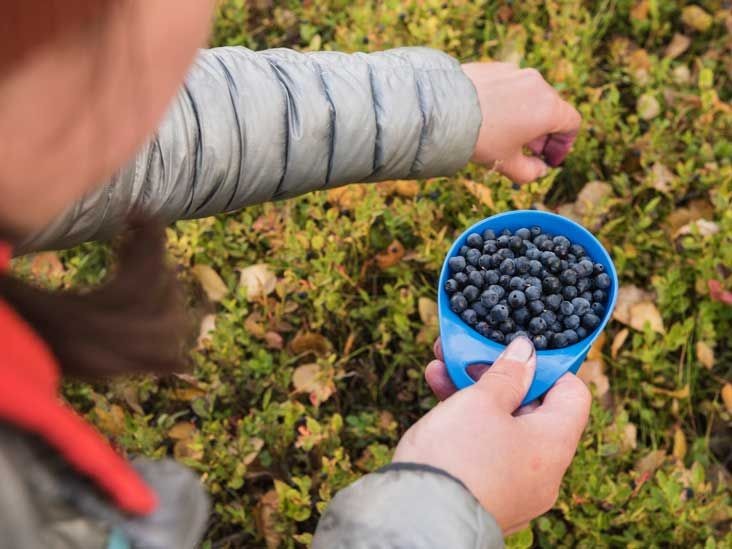
Contents
10 Emerging Health Benefits of Bilberries
Bilberry (Vaccinium myrtillus) is a small, round, flat-topped fruit that grows in the wild. They grow on short, wiry bushes, primarily on high land in northern and west Europe.
Blueberries are sometimes mistaken for blueberries due to their tiny size and blue hue. However, they taste very different from blueberries.
What are the suitable ways to incorporate bilberries in your diet?
Ways to incorporate bilberries into your diet include:
- Bilberry tastes acidic when eaten fresh.
- Boiling bilberries with sugar gives a delightful, deep flavor that can be used to make jam or pie filling.
- Drain the juice from the cooked berries before using them in a pie to avoid a soggy crust.
- Bilberry pie is a traditional British delicacy popular in the North of England, especially in Yorkshire.
- It is best served warm with cream or vanilla ice cream.
- Substitute bilberries for blueberries in recipes like muffins, crumbles, tarts, and cheesecakes.
- Raw bilberries have a more sour flavor than blueberries, so using them in a dish will result in a different taste.
10 health benefits of bilberries
Here are 10 health benefits of bilberries:
- Improve heart health: Bilberry extract may help reduce blood sugar and cholesterol levels, lowering the risk of heart disease. It also aids with circulation and lowers the risk of blood clot formation.
- Lower blood sugar levels: Bilberry extract can help reduce blood glucose levels, but monitoring is necessary if using with blood glucose-lowering medications.
- Antioxidant properties: Bilberries are rich in anthocyanins and polyphenols, which have antioxidant effects that support healthy eyesight and combat age-related oxidative stress.
- Reduce blood pressure: Bilberry can help lower blood pressure, contributing to healthier circulation and vascular system.
- Improve eye health: Bilberry contains anthocyanins that have potent antioxidant effects beneficial for eye health. It may improve visual results and aid in the treatment of retinopathy.
- Prevent cancer: Bilberry extracts inhibit malignant cell proliferation, potentially helping to prevent colon cancer, breast cancer, and leukemia.
- Lower the risk of Alzheimer’s disease: Fruit and vegetable juices high in phenolic components, such as bilberry, may reduce the risk of Alzheimer’s disease.
- Protect from liver damage: Bilberry’s antioxidants protect against liver damage caused by stress, increasing beneficial glutathione and vitamin C levels.
- Improve digestive health: Bilberries target the intestines, reducing inflammation and aiding in the treatment of diarrhea. They enhance stomach mucus, promoting thorough digestion and healing of stomach ulcers.
- Improve chronic venous insufficiency: Bilberry extracts are used to treat chronic venous insufficiency, but further research is needed to support their effectiveness.
QUESTION
Are there any downsides with bilberries?
Bilberries are usually considered safe for consumption. However, it is advised not to consume more than 60 grams of dried, ripe berries per day.
Bilberries are rich in anthocyanosides, which provide various health advantages. Dried powdered bilberries are used as supplements to improve health. However, excessive intake can have negative effects on health.
- Allergic reactions: Allergic responses to bilberries can occur, especially in individuals allergic or sensitive to tannin-containing foods.
- Contraindicated in pregnancy: Pregnant or nursing women should avoid bilberry extracts due to unknown safety.
- Interactions with blood thinning medications: High flavonoid consumption from bilberry supplements may increase the risk of bleeding, especially when used with blood-thinning medications or by individuals with bleeding problems.
- Interacts with diabetes medications: Bilberry lowers blood sugar, potentially enhancing the effects of diabetes medicine. It should be avoided if taking diabetes medication or other blood sugar-lowering herbs.
Eating more bilberries or other anthocyanin-rich fruit may have protective effects in some situations, but it should not replace traditional medical therapy or preventative measures.
Eating more bilberries or other anthocyanin-rich fruit may have protective effects in some situations, but it should not replace traditional medical therapy or preventative measures.


